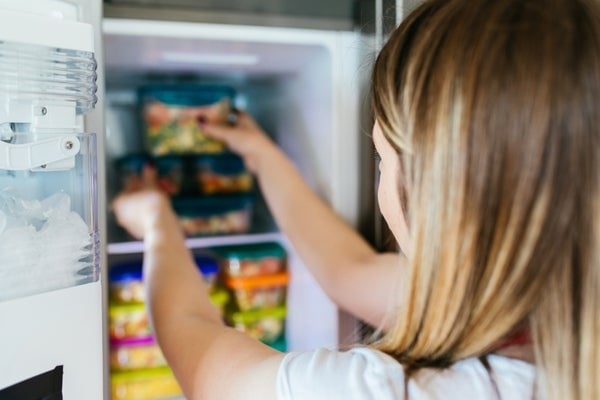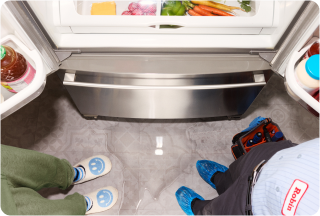Why is My Freezer not Freezing? Here are 5 Reasons Why

Did your freezer stop working? There are many reasons why your freezer might not be freezing. Find out why from the Home Matters experts.


Did your freezer stop working? There are many reasons why your freezer might not be freezing. Find out why from the Home Matters experts.
Freezers are the dependable appliances of the kitchen. You can always trust that your midnight snack craving will be satisfied simply by sleepily stumbling into the kitchen and perusing your faithful freezer. From frozen vegetables, fruit, and meat to ready-to-bake pizzas and delectable ice cream, your freezer is the go-to place for last-minute dining. But what if your freezer is not freezing?
When your freezer stops doing the one thing it is meant to do—freezing—don’t let it get you down. Some simple fixes could help get it back to keeping your groceries icy cold in no time. Review this handy list of freezer issues and quick fixes compiled by American Home Shield®.
How Do Freezers Work?
Most freezers work by using a cooling pipe filled with fast-evaporating liquid coolant. This process involves compressing, condensing, and evaporating the refrigerant gas through the freezer’s mechanical components.
Common freezer components
What Are Some Common Freezer Problems?
A freezer not fulfilling its icy destiny doesn’t necessarily mean disaster. In fact, many issues related to your freezer not working can be remedied through simple troubleshooting. Before getting in a freezer fluster, take a moment to chill out, diagnose, and fix the issue.
A freezer that runs constantly may stem from multiple causes. One cause is that the temperature control thermostat is not working properly, forcing the freezer to run constantly to try and meet the correct temperature. If this is the case, you can try resetting the thermostat or replacing it altogether.
Another reason is that the evaporator fan motor or condenser fan motor is malfunctioning. If this is the issue, it’s probably time to call a professional.
Your freezer will likely make a lot of noises as part of its regular running. For example, if it sounds like your freezer is making popcorn, it’s probably because the inside walls are expanding and contracting through temperature fluctuations. Buzzing, humming, gurgling and clicking noises are also quite normal and signify that your fridge and freezer are working.
However, new or excessively loud sounds might indicate that something is wrong with your freezer. These noises could mean that your condenser coils are dirty, blocking proper airflow. To remedy the situation, you can clean your condenser coils every two to three months using a refrigerator coil brush.
The noises could also mean that your freezer’s evaporator fan isn’t working correctly; if this is the case, you should repair or replace it soon. If the evaporator fan is damaged or old, you may notice a loud buzzing or clicking noise. Your freezer might also run less cold than usual.
If your freezer is leaking water, or if you have frost in the freezer, you likely have a clogged or (ironically) frozen defrost drain. You can unclog it by filling a turkey baster with hot water and using it to clear out the drain tube.
Thinking about coverage?
Security for your home. Protection for your budget.
Why Is My Freezer Not Freezing?
A freezer not freezing can make even the most relaxed person feel hot under the collar. A freezer that’s stopped working doesn’t have to mean hundreds of dollars down the drain. Figuring out what causes a freezer to stop freezing is the first step to fixing it—saving your freezer and your budget.
1. Freezer Air is Escaping.
If you find your freezer cold but not freezing, the first thing you should do is test your freezer door. You may have failed to notice that an item is sticking out enough to keep the door ajar, meaning that precious cold air is escaping your freezer.
Similarly, older or poorly installed freezer door seals might cause your freezer temperature to drop. You can test your freezer door seals by placing a piece of paper or dollar bill between the freezer and door. Then, close the freezer door. If you can pull out the dollar bill, your freezer door sealer needs to be repaired or replaced.
2. Freezer Contents are Blocking the Evaporator Fan
Make sure that there is enough space under the evaporator fan, usually in the rear of the freezer, so that the cold air emerging from the fan can reach everywhere in your freezer.
3. Condenser Coils are Dirty.
Dirty condenser coils can reduce your freezer’s overall cooling capacity since dirty coils make the condenser retain heat rather than release it. This causes the compressor to overcompensate. To prevent this from happening, make sure to clean your condenser coils regularly.
4. Evaporator Fan is Malfunctioning.
More serious reasons that your freezer is not freezing involve malfunctioning internal components. If your evaporator fan is not working correctly, first unplug your refrigerator and remove and clean the evaporator fan blades. Ice buildup on evaporator fan blades often prevents your freezer from properly circulating air. If you notice a bent fan blade, you will need to replace it.
If the evaporator fan blades are spinning freely, but the fan won’t run, you may need to replace a defective motor or repair broken wires between the fan motor and thermostat control.
5. There is a Bad Start Relay.
Finally, a freezer that isn’t freezing might mean that your start relay is not working as it should, meaning that it isn’t giving power to your compressor. You can conduct a physical test on your start relay by unplugging your refrigerator, opening up the compartment at the back of your freezer, unplugging the start relay from the compressor, and then shaking the start relay. If you hear a rattling noise that sounds like dice in a can, your start relay will have to be replaced. If it does not rattle, that might mean that you have a compressor issue, which will require professional repair assistance.
Tips for Freezer Maintenance
A consistently cold freezer is a happy freezer. In addition to keeping the coolest appliance in the house as cold as possible and properly wrapping food for storage, here are the tried-and-true ways to enjoy uninterrupted coolness.
1. Review the owner’s manual for maintenance instructions. Familiarizing yourself with your freezer now will do wonders to help you keep your cool when it’s time to maintain it or fix it down the road.
2. Periodically check the freezer’s thermostat. For a freezer to perform optimally, its thermostat should be set at zero degrees Fahrenheit (-18 degrees Celsius). If your model doesn’t have a built-in thermostat, use a thermometer to check the temperature.
3. Keep the interior clean. With a damp rag and a bit of dish liquid, you can have your freezer sparkling in no time.
As with anything you depend on every day, the better you treat your freezer, the better it will treat you (and your food) in return.
It’s also a good idea to sign up for a home warranty plan that includes refrigerator warranty coverage. A home warranty from American Home Shield offers coverage for home systems and appliances, including your refrigerator and freezer. To ensure that your budget is protected from issues due to normal wear and tear, like your freezer not freezing, check out our pricing and plans today.
Learn more about warranty coverage that keeps your refrigerator running.

AHS assumes no responsibility, and specifically disclaims all liability, for your use of any and all information contained herein.
Have a plan for your home when things don't go according to plan
Shop Home Warranties